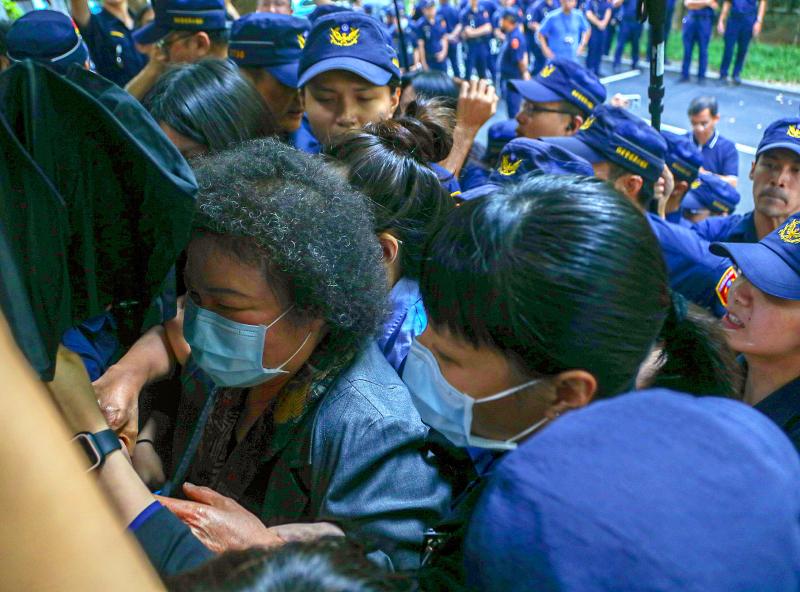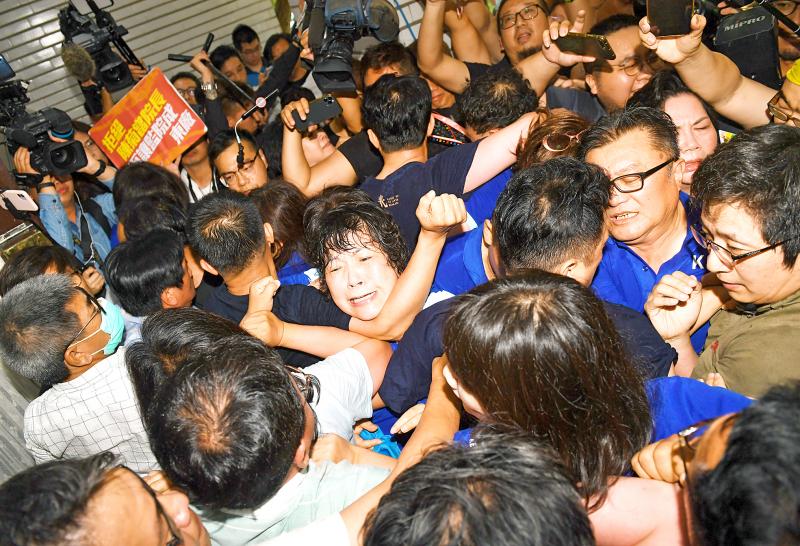Chinese Nationalist Party (KMT) Legislator Sandy Yeh (葉毓蘭) yesterday proposed amendments to the Legislators’ Conduct Act (立法委員行為法) to limit the power of police to constrain the personal freedom of lawmakers when in session at the Legislative Yuan.
The proposal comes after physical altercations involving KMT lawmakers who tried to block the nomination process of Control Yuan members in July.
KMT leaders had accused Legislative Speaker You Si-kun (游錫堃) of the Democratic Progressive Party of authorizing excessive police force to protect then-Control Yuan presidential nominee Chen Chu (陳菊), saying that involving the police had led to obstructions of their personal freedom and legislative duties.

Photo: CNA
Yeh proposed the amendments to outline strict rules on the use of police force inside the parliament.
“When police officers limit legislators’ movements and personal freedom, disrupting their legislative duties within the parliamentary grounds, severe punishment must be imposed, with sentences being 50 percent higher than usual. This proposed draft will be submitted next Tuesday,” Yeh said.
Prior to 1991, police had been deployed inside the Legislative Yuan six times, but they had no legal authorization, Yeh said, adding that police had not been deployed for the past 20 years, until July 14 this year.

Photo: CNA
“While legislators were to conduct a review of Control Yuan nominees, legislative top officials called for a large police force to enter the parliament and protect Chen Chu,” she said. “The police action undermined the Legislative Yuan’s independence, setting a deplorable precedent in violating the constitutional framework.”
“In France, Germany, Japan, the UK, the US and other democratic countries, they adhere to the constitutional codes and parliamentary rules,” she added.
Referring to Article 3 of the Organic Act of the Legislative Yuan (立法院組織法), which stipulates that the legislative speaker must maintain order and conduct legislative proceedings on the basis of fairness and objectivity, Yeh said that there are no provisions granting the speaker the right to deploy the police.
The authority to deploy the police should be limited to maintaining order and removing obstacles to legislative proceedings, she said, adding that “the rules must guarantee the independence and self-governance of the Legislative Yuan.”
“When obstructions to the proceedings occur, legislators across party lines must try to solve the problem within one day, conforming to the self-governance principle of the Legislative Yuan,” Yeh said.
Other than the Sixth Special Police Corps and one security police squadron at the Legislative Yuan, other police units should be in general prohibited from entering the parliament grounds, Yeh added.

‘DENIAL DEFENSE’: The US would increase its military presence with uncrewed ships, and submarines, while boosting defense in the Indo-Pacific, a Pete Hegseth memo said The US is reorienting its military strategy to focus primarily on deterring a potential Chinese invasion of Taiwan, a memo signed by US Secretary of Defense Pete Hegseth showed. The memo also called on Taiwan to increase its defense spending. The document, known as the “Interim National Defense Strategic Guidance,” was distributed this month and detailed the national defense plans of US President Donald Trump’s administration, an article in the Washington Post said on Saturday. It outlines how the US can prepare for a potential war with China and defend itself from threats in the “near abroad,” including Greenland and the Panama

A magnitude 4.9 earthquake struck off Tainan at 11:47am today, the Central Weather Administration (CWA) said. The hypocenter was 32.3km northeast of Tainan City Hall at a depth of 7.3km, CWA data showed. The intensity of the quake, which gauges the actual effect of a seismic event, measured 4 in Tainan and Chiayi County on Taiwan's seven-tier intensity scale, the data showed. The quake had an intensity of 3 in Chiayi City and County, and Yunlin County, while it was measured as 2 in Kaohsiung, Nantou County, Changhua County, Taitung County and offshore Penghu County, the data showed. There were no immediate reports of

The Chinese Nationalist Party (KMT) is maintaining close ties with Beijing, the Democratic Progressive Party (DPP) said yesterday, hours after a new round of Chinese military drills in the Taiwan Strait began. Political parties in a democracy have a responsibility to be loyal to the nation and defend its sovereignty, DPP spokesman Justin Wu (吳崢) told a news conference in Taipei. His comments came hours after Beijing announced via Chinese state media that the Chinese People’s Liberation Army’s Eastern Theater Command was holding large-scale drills simulating a multi-pronged attack on Taiwan. Contrary to the KMT’s claims that it is staunchly anti-communist, KMT Deputy

RESPONSE: The government would investigate incidents of Taiwanese entertainers in China promoting CCP propaganda online in contravention of the law, the source said Taiwanese entertainers living in China who are found to have contravened cross-strait regulations or collaborated with the Chinese Communist Party (CCP) could be subject to fines, a source said on Sunday. Several Taiwanese entertainers have posted on the social media platform Sina Weibo saying that Taiwan “must be returned” to China, and sharing news articles from Chinese state media. In response, the Mainland Affairs Council (MAC) has asked the Ministry of Culture to investigate whether the entertainers had contravened any laws, and asked for them to be questioned upon their return to Taiwan, an official familiar with the matter said. To curb repeated